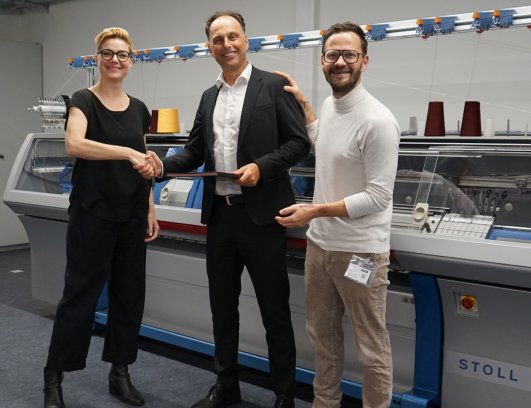
Colorifix x Grupo Impetus x OceanSafe
Karl Mayer direct-to-customer production enables impressive margins and marketing opportunities to be realised.

22nd July 2024
Innovation in Textiles
|
Berlin
Berlin-based fashion hub Vorn is currently constructing a ‘pixel-to-product’ microfactory that will be based on three Stoll ADF all-in-one flat knitting machines and digital solutions from Karl Mayer’s software arm KM.ON.
The platform will bring together academics, brands, research institutes, start-ups and SMEs to develop new hardware and software solutions for the physical, digital or hybrid implementation and testing of promising made-to-order concepts, products and processes.
“We are delighted to be involved in this fashion microfactory project, because with our machines and their enormous patterning flexibility, and with KM.ON digital solutions which significantly shorten lead times, we have been focusing on made-to-order for a long time,” says Michael Händel, vice-president of sales and service at Stoll.
“In our demonstration factory, we will offer software and services to enable progressive players to pilot their changes quickly and then scale them up for the market,” adds Marte Hentschel, co-CEO of Vorn. “We are creating all the prerequisites for the fast, market-oriented and price-conscious implementation of small series production. This saves storage, material and return costs, reduces environmental impact and ensures more resilient supply chains in response to the challenges of our time.
“In addition, direct-to-customer production offers exciting margins and marketing opportunities. To take full advantage of this, we are working with innovative partners from the entire value chain, from yarn suppliers to retailers.
“Stoll’s flat knitting machines offer unique possibilities for the economical production of small batches, particularly seamless garments. We also want to integrate Stoll’s customers into our network in order to scale up production to industrial levels.”
The opening of the microfactory is planned for October, and Hentschel observes that while concepts of the on-demand production of individualised items are not new and remain challenging, a lot has changed in recent years.
“Today, we have the possibilities of a completely new generation of technology at our disposal,” she says. “Hardware and software solutions are being developed and refined with enormous power. The software offerings of the Create family from KM.ON, for example, offer a wide range of potential for the production of knitwear collections on demand and a set of modification options makes simple, economical mass customisation possible. The crisis in the retail sector is also forcing retailers to come up with new concepts and providers. Berlin is a good place for the necessary change. We are also working closely with the team that supported the adidas Speedfactory project and are benefiting from what we have learned.”

Business intelligence for the fibre, textiles and apparel industries: technologies, innovations, markets, investments, trade policy, sourcing, strategy...
Find out more